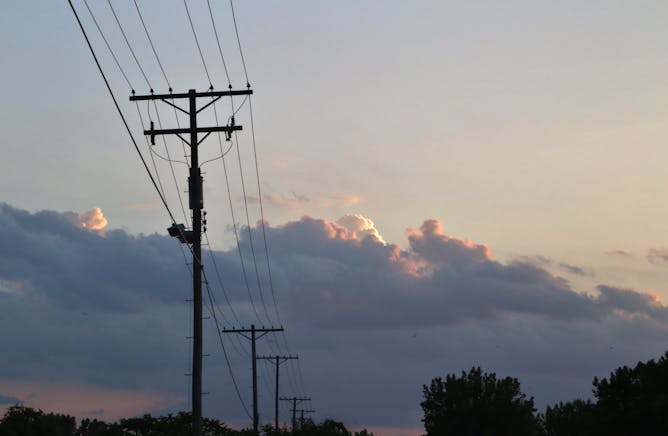|
|
|
|
You may have heard of food insecurity, a term that means not having consistent access to enough food for an active, healthy life. Energy insecurity is a similar idea that’s used to describe someone who has trouble paying to heat, cool and power their home.
It was already a problem for many low-income Americans before the COVID-19-induced recession. And now even more households are struggling to keep the lights and air conditioner on, according to a recent survey by Indiana University’s Sanya Carley and David Konisky.
As parts of the U.S. experience heat waves that highlight the issue’s urgency, the energy scholars have some ideas about what government can do to help.
Also today:
|
Jennifer Weeks
Environment + Energy Editor
|

|
|

The COVID-19 recession has made it harder for many Americans to pay their energy bills.
Getty Images
Sanya Carley, Indiana University; David Konisky, Indiana University
Many Americans had trouble paying their energy bills before COVID-19, and the current recession is making the problem worse.
|
Arts + Culture
|
-
Brandon W. Hawk, Rhode Island College
Stories featuring demons and sex date back to early Judaism and Christianity. They inspired the witch craze and continue to be believed by many conservative Christians in America.
|
|
Science + Technology
|
-
Lorrie Cranor, Carnegie Mellon University; Hana Habib, Carnegie Mellon University
Private mode browsing is a useful way to cover your online tracks. Just don't read too much into the word 'private.'
|
|
Ethics + Religion
|
-
Ken Chitwood, Concordia College New York
Muslims throughout the world will celebrate the holiday of Eid al-Adha, or Festival of Sacrifice, beginning at sundown on July 30, but the coronavirus has changed many things.
|
|
Health + Medicine
|
-
Eric Kyere, Indiana University
The health care inequities suffered by Black Americans today began centuries ago.
-
Steven DeKosky, University of Florida; Todd Golde, University of Florida
A blood test to detect Alzheimer's disease in people who have symptoms and even those who don't has been shown to work. Scientists still need to improve its accuracy rate to almost 100%, however.
-
Ronald D. Fricker, Jr., Virginia Tech
Test positivity rates measure the success of a testing program. Even though the US performs a huge number of tests, high test positivity rates across the country show that that it still isn't enough.
|
|
Politics + Society
|
-
Mark Davidson, Clark University; Kevin Ward, University of Manchester
With sales tax revenues plummeting because of the pandemic, many cities will face bankruptcy – and that could affect everything from retirees' pensions to whether roads get fixed.
-
Amy Cooter, Vanderbilt University
Some militia members see political unrest as an opportunity to wrest power from an overbearing federal government. But others support strict enforcement of law and order.
|
|
Economy + Business
|
-
Elizabeth J. Dale, Seattle University
By not attaching any strings to the money, championing representation and generally taking care to respect nonprofit leaders, she's following five best practices.
|
|
Education
|
-
Susan Sonnenschein, University of Maryland, Baltimore County; Elyse R. Grossman, Johns Hopkins Bloomberg School of Public Health
The stress of having children do distance learning at home during the pandemic is linked to an increase in alcohol consumption among parents, a new survey finds.
-
Kevin Singer, North Carolina State University; Alyssa N. Rockenbach, North Carolina State University; Laura S. Dahl, North Dakota State University; Matthew J. Mayhew, The Ohio State University
Not many Latino students major in business. A researcher explores the reasons why.
|
|
Most read on site
|
-
Beth Humberd, University of Massachusetts Lowell; Deborah Salon, Arizona State University; Scott F. Latham, University of Massachusetts Lowell
The post-pandemic office will be a lot more flexible but still will be necessary to help build relationships among colleagues, according to three scholars.
-
Jelani M. Favors, Clayton State University
Though he had a speech impediment and came from humble beginnings, John Lewis went on to become a giant of the civil rights movement.
-
Katy Ramsey Mason, University of Memphis
Millions of Americans may be at risk of losing their homes in coming months as eviction moratoriums expire and courts resume a process that heavily favors landlords.
|
|
| |
| |
| |
| |
| |
| |
|
|
|
|
|
|
|